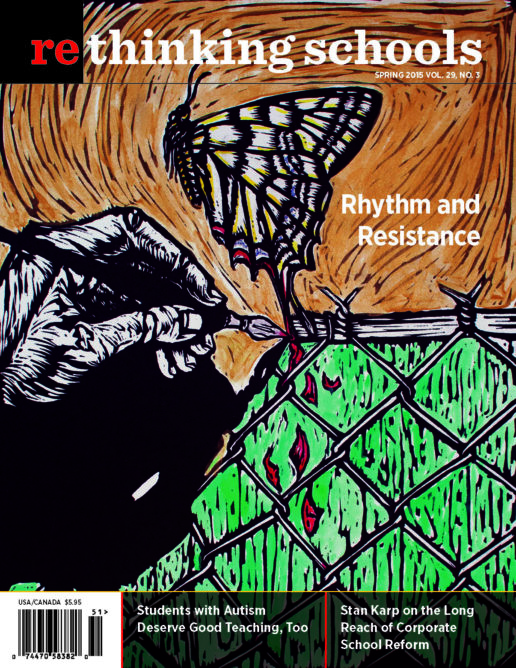Our picks for books, videos, websites, and other social justice education resources 29.3
Elementary School
Morris Micklewhite and the Tangerine Dress
By Christine Baldacchino illustrated by Isabelle Malenfant
(Groundwood Books, 2014)
32 pp.
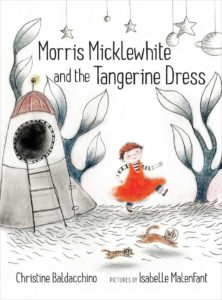
Morris likes to do lots of things. He likes to paint, do puzzles, and sing. He also likes to wear a tangerine dress from the dress-up center. The other children tease him so much that he gets sick and has to stay home from school. In the end, the power of his imagination wins over the other kids, who join him at play. This is a wonderful book for challenging gender roles and conveying the pain caused by teasing.
Videos
Selma: The Bridge to the Ballot
Produced by Bill Brummel
(Teaching Tolerance, 2015)
40 min.
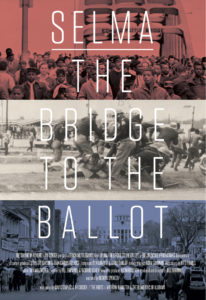
Teachers and high school students are front and center in this short documentary on the 1960s freedom movement in Selma. The film uses an effective combination of historic footage, interviews, photos, and graphic novel-like dramatic drawings—all to a freedom song soundtrack. Many of the key points referenced in the Zinn Education Project article by Emilye Crosby, “Ten Things You Should Know About Selma Before You See the Film,” are included in this classroom-friendly documentary. As with all Teaching Tolerance films, it is free for teachers. Middle and high school.
Pretty Slick
By James Fox
(The Video Project, videoproject.com)
71 min.
Pretty Slick explores an often-overlooked aspect of the 2010 BP Gulf Oil Spill: the massive use of the toxic dispersant Corexit. BP sought to hide the terrible impact of the oil spill by dispersing and sinking oil, rather than cleaning it up. This is more than an historical footnote. The film highlights the fundamental contradiction between environmental health and the search for increasingly hard-to-find fossil fuel deposits. Pretty Slick would be an excellent film in science, environmental studies, government, and economics classes. And it would make a valuable addition to Brady Bennon’s role play “Environmental Crime on Trial” about the BP oil disaster, included in our new book A People’s Curriculum for the Earth.
Policy
Being Bad: My Baby Brother and the School-to-Prison Pipeline
Crystal T. Laura
(Teachers College Press, 2014)
130 pp.
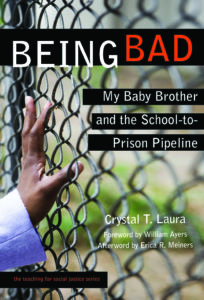
In this remarkably intimate book, Crystal T. Laura follows the life trajectory of her brother Chris—labeled a “bad kid” by his school. It’s a painful, revealing, richly detailed inside look at the process that takes a boy from school to incarceration. Laura opens the book: “Dear Reader, what you are holding is the record of a conversation I needed to have with myself that you will be better for overhearing. It’s about my little brother, Chris, whom I love crazily and whom, until I wrote this book, I only pretended to understand.” Being Bad combines personal narrative, scholarship, and social criticism with humor, love, and anger. It’s a painful chronicle, but not without hope. As Bill Ayers writes in the foreword: “[Laura] invites us to join hands with her and become part of the solution: Listen to children and youth; protect them and challenge them; embrace them with generosity and hope. Her vision of teaching with love and joy and justice hits hard because we know how hard-earned that revelation is.”
Curriculum Resources
Class Lives: Stories from Across Our Economic Divide
Edited by Chuck Collins, Jennifer Ladd, Maynard Seider, and Felice Yeskel
(ILR Press, 2014)
228 pp.
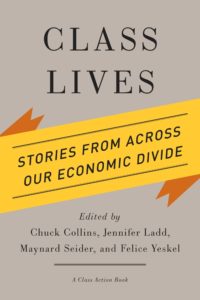
Social class is one of the great silences in the school curriculum. In her introduction, Felice Yeskel quotes Noam Chomsky, who calls class “the unmentionable five-letter word.” Class Lives is a collection of short, personal essays by people across the social class spectrum—ranging from poor and low-income to the owning class. These student-friendly readings could inspire students to reflect on their own experiences of social class. They are personal, funny, poignant, defiant. As one reviewer commented, too often class is talked about in school—and our society more broadly—as a category. The Class Lives editors set out to include stories that show how class lives in and through us all—limiting, privileging, dividing. Advanced middle and high school.
Voices of a People’s History of the United States
10th Anniversary Edition
Edited by Howard Zinn and Anthony Arnove
(Seven Stories Press, 2014)
696 pp.
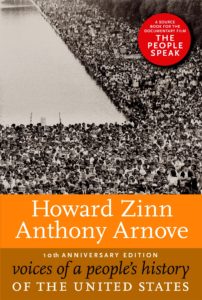
Voices of a People’s History of the United States supplements the great historian and activist Howard Zinn’s A People’s History of the United States with first-person readings and documents that flesh out themes in that classic book. The chapter subjects in Voices mirror those in A People’s History, making this an especially helpful volume to use as a companion text. Some of the people and movements featured in Voices are well known: Frederick Douglass, Sojourner Truth, Henry David Thoreau, Elizabeth Cady Stanton, W.E.B. DuBois, Mother Jones, and Muhammad Ali. But many others have been hiding in the cracks of history, waiting to speak to future generations of students and activists.
In his introduction to the book’s first edition, Zinn wrote that he wanted to “bring into light the hidden resistance of the people against the power of the establishment: the refusal of Native Americans to simply die and disappear; the rebellion of black people in the anti-slavery movement and in the more recent movement against racial segregation; the strikes carried out by working people to improve their lives.To omit or to minimize these voices of resistance is to create the idea that power only rests with those who have the guns, who possess the wealth, who own the newspapers and the television stations. I want to point out that people who seem to have no power, whether working people, people of color, or women—once they organize and protest and create movements—have a voice no government can suppress.”
Howard Zinn died in 2010. Co-editor Anthony Arnove writes that his selections for this 10th anniversary edition of Voices were guided by his conversations with Zinn following the publication of the book’s 2009 edition and “my sense of the movements since 2010 that would have most excited him.” Now, more than ever, we need to draw students’ attention to the impact and potential of social movements. As we wrote in our review of Voices’ first edition: “Pick up the book, open it to any page, and start reading. It’s impossible not to find something that could be used in a social studies or language arts class.”
Passenger on the Pearl: The True Story of Emily Edmonson’s Flight from Slavery
By Winifred Conkling
(Algonquin Young Readers, 2015)
170 pp.
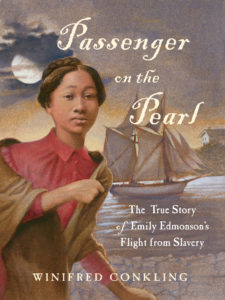
In 1848, 77 people in Washington, D.C., made a brave and carefully planned escape from slavery. They boarded a schooner called The Pearl to sail north to freedom. Winifred Conkling tells this history through the story of one passenger, teenager Emily Edmonson. Starting with Emily’s mother, who grew up in slavery and gave birth to Emily and her siblings under those horrendous circumstances, Conkling conveys the searing horrors of slavery and the measures people took to escape. The book includes background for key terms and issues, including the debate among abolitionists about buying an individual’s—such as Emily’s—freedom when those same funds were needed to fight slavery as an institution. As in her other book of historical fiction, Sylvia & Aki, Conkling makes a vital story and scholarly research accessible and gripping for young adult readers.

